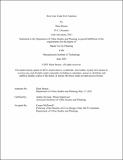| dc.contributor.advisor | Sevtsuk, Andres | |
| dc.contributor.author | Strauss, Ilana | |
| dc.date.accessioned | 2023-10-18T17:08:49Z | |
| dc.date.available | 2023-10-18T17:08:49Z | |
| dc.date.issued | 2023-06 | |
| dc.date.submitted | 2023-09-18T20:06:50.446Z | |
| dc.identifier.uri | https://hdl.handle.net/1721.1/152471 | |
| dc.description.abstract | America has a love affair with the automobile, as the saying goes. The average American household has 1.88 cars. Songs like “Life is a Highway,” “On the Road Again,” and countless others celebrate the car. Americans have accepted endless sprawl, hours stuck in traffic, car crashes, and lung disease because they loved cars from the beginning. Or did they? I will dig into the history of how car-centrism took over the country to explore an alternative theory: what if Americans didn’t choose cars out of love, or even at all? What if a car-centric country was largely forced on Americans, and a narrative of “love” spun after the fact? | |
| dc.publisher | Massachusetts Institute of Technology | |
| dc.rights | In Copyright - Educational Use Permitted | |
| dc.rights | Copyright retained by author(s) | |
| dc.rights.uri | https://rightsstatements.org/page/InC-EDU/1.0/ | |
| dc.title | How Cars Took Over America | |
| dc.type | Thesis | |
| dc.description.degree | M.C.P. | |
| dc.contributor.department | Massachusetts Institute of Technology. Department of Urban Studies and Planning | |
| mit.thesis.degree | Master | |
| thesis.degree.name | Master in City Planning | |
